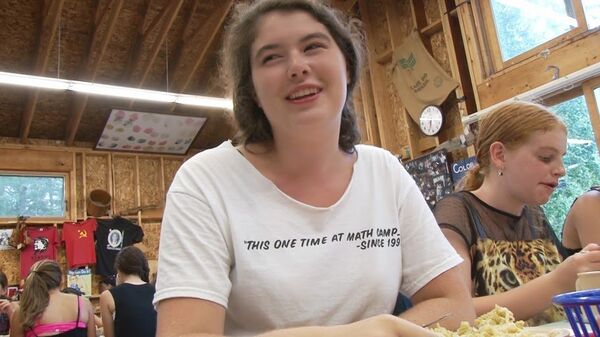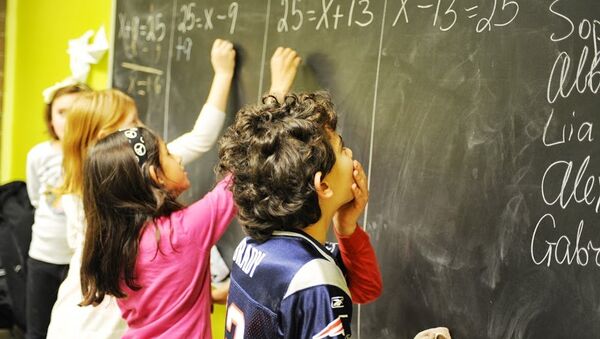SPRINGFIELD, New Hampshire, August 19 (by Karin Zeitvogel for RIA Novosti) – In a woodland setting on the banks of a New Hampshire lake, the sounds of summer camp waft through the air as counselors sing songs and put on skits, lake water splashes during a morning dip, and – there’s one more added extra – kids take math lessons. But not just any old math instruction, this is math taught the Russian way.
Run by the US-based Russian School of Mathematics, the camp offers the usual activities like arts and crafts, theater, archery, making s’mores and singing around a campfire, but also 90 minutes of math every day.
The camp was started in 1998 by Russian immigrants Inessa Rifkin and Irina Khavinson, who four years earlier had set up the Russian School of Mathematics (RSM) in Rifkin’s home in Newton, Massachusetts, an upscale suburb of Boston.
Rifkin was prompted to start the after-school mathematics program by what she calls her “terrifying realization” that her teenaged son Ilya’s level in math was not where she thought it should be as he was about to start high school.
“He couldn’t grasp simple equations with fractions. He didn’t understand the beauty of math, the beauty of learning,” Rifkin, who trained as an engineer in the former Soviet Union before emigrating in 1988, told RIA Novosti.
Rifkin started to work one-on-one with her son, using the Russian books that she’d learned math with in the Soviet Union, when mathematicians were among the rare academics who were not subjected to state interference or censorship and the discipline was in its heyday in Russia.

Rifkin learned that other parents in Newton, which is home to the largest Russian community in Massachusetts, shared her fears about their kids’ level in math, “So I decided to start a small class of five kids,” she said.
She convinced another Russian émigré, Khavinson, who she knew had been a math teacher in Russia, to give up a well-paid job as an accountant and go back to teaching, and RSM was born in the basement of Rifkin’s home.
From those small beginnings, RSM has grown exponentially, giving after-school lessons to more than 8,000 children in six states – California, Connecticut, Illinois, Kentucky, Massachusetts and Washington – hosting hundreds of children at summer camp in New Hampshire; and offering online courses.
The school’s phenomenal growth is driven by word of mouth and its success in taking kids who are average in math and moving them to the front of the class.
According to the RSM website, the average score on the math SAT exam among 11th-graders enrolled in an RSM program is 774 out of 800. In 2011, the US average on the test, which aims to assess how well a student will do in college, was 514.
Lior Eisenberg took the math SAT when he was 13 and scored 790.
“Most of it’s because of the Russian School of Math,” he told RIA Novosti, adding that he plans to take the test again to boost his score to a perfect 800.
A key ingredient in RSM’s secret sauce, say Rifkin and Khavinson, is its teachers. Like Khavinson, many are graduates of specialized mathematics and teaching schools in the former Soviet Union, and their teaching philosophy derives from the cognitive development theories of 20th-century Russian psychologist Lev Vygotsky, who believed that even very young children are capable of abstract reasoning.
RSM starts teaching kids algebra when they’re in the first grade, seven years before most American students start doing it in their final year of middle school.
Starting kids young in disciplines that are thought by some in the United States to be too difficult even for middle school students – the state of California has floated the idea of not teaching algebra before high school, saying eighth grade is “too early” for students to be introduced to it – is not the only way that RSM sets itself apart.
RSM teachers make math fun and applicable to daily life.
“In American schools, elementary schools especially, they think that mathematics is just memorization, computation and facts,” Khavinson said.
“We’re doing it differently. Each of our problems is like a puzzle – kids love puzzles – and we teach a lot of logic. All our kids understand what they’re doing,” she said.
RSM only hires teachers who love mathematics, because “if the teacher doesn’t love it, if the teacher is afraid of it, the teacher cannot teach it. They will only teach a fear of math,” Rifkin said.
The system of teaching that is used at RSM is taken from another time, when both the United States and Russia were ranked much higher in international classifications of academic achievement, including in math, and being applied to try to reverse a downward trend in US school test results.
The most recent Program for International Student Assessment (PISA) report, released in 2010 and which compares the knowledge and skills of 15-year-olds in 70 countries, ranked the United States a below-average 31st in mean scores for mathematics and Russia 38th.
In 2000, when 32 countries were assessed in the first PISA report, US 15-year-olds got average scores in math, and Russians were just below average.
RSM’s methodology seems to be helping American kids reverse the country’s slumping math scores – at least among kids whose parents are willing to pay at least $25 an hour over a year for after-school classes or $1,640 for two weeks of summer camp.
But the hour-and-a-half of math at summer camp is not why kids come back year after year to the shores of Lake Sunapee.
Teens Karen Garber and Polina Brodskiy were back at summer camp for the fourth year in a row.
“I’m kind of forced to go to the math part, but it’s OK,” said Garber.
“I can tolerate it, I guess,” said Brodskiy.
But the real reason the two girls were back at camp again this year was a simple one that has brought American girls back to summer camp for generations.
“Boys,” they said, leaning forward and speaking in hushed tones that were hard to hear over the din of clattering cutlery in the camp cafeteria, as if they were sharing the solution to a mathematical problem that they had just cracked, thanks to the summers they’ve spent at RSM’s summer camp.

